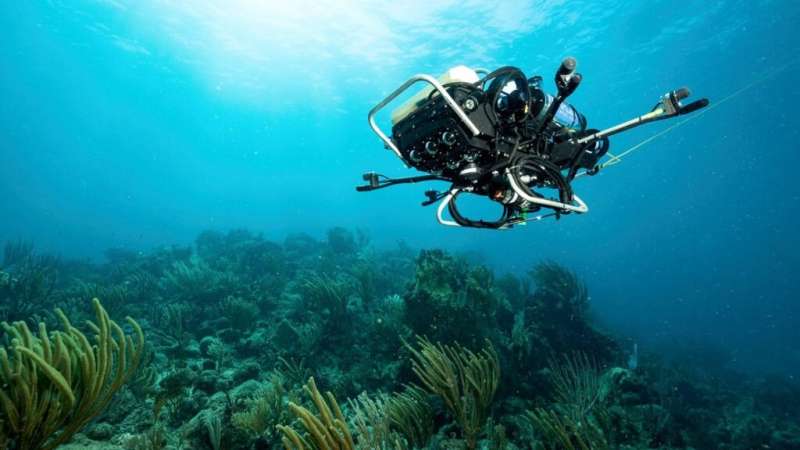Researchers propose a new technology-centered focus to study and conserve coral reefs

The scope and scale of threats facing coral reefs demand new ways of approaching the questions that need to be answered in order to ensure the future of reefs worldwide. That’s the conclusion of a paper released in print today by a multi-disciplinary scientists and engineers from the Woods Hole Oceanographic Institution (WHOI).
The paper, which appears in the current issue of the journal Environmental Science & Technology is authored by members of WHOI’s Reef Solutions Initiative, lays out the group’s vision to address the growing coral reef crisis. The authors hold that advanced monitoring and diagnostics and a research strategy that uses case-study reefs to test and implement solutions before scaling up to reefs worldwide is needed in order to leverage recent technological innovations on time scales that will make a difference to the most at-risk reefs.
“For decades, the reef science community has relied on individual divers and photographic surveys to document reef health and devise conservation and intervention plans,” said WHOI microbiologist and Reef Solutions team leader Amy Apprill. “But the challenges reefs face today are so complex and interrelated that we need new ways of tackling this crisis before it’s too late.”
Coral reefs are among the most biodiverse ecosystems in the ocean, with an estimated one-quarter of all marine species making use of reef habitats at some point in their life cycle. Humans, also depend on these unique places. As many as one billion people worldwide rely on the natural services that coral reefs provide, including fisheries that generate food and income, reef structures that protect coastal communities from waves, and tourism that supports local and national economies. Estimates of the value of these goods and services provided by reefs worldwide reach $2.7 trillion.
Despite such broad environmental and economic importance, human activity is taking a severe toll on reefs. Over the past decade, the ocean has lost over 13.5% of its coral cover, largely due to climate change, disease, overfishing, pollution, and other human impacts.
One response to this loss by researchers and conservationists has been to emphasize strategies that often rely on individual divers making painstaking photographic surveys to identify visual clues of reef declines, as well as labor-intensive interventions such as transplanting corals to help rebuild reef structure. The Reef Solutions approach brings to bear interdisciplinary research that mirrors the interwoven biological, chemical, and physical processes supporting reef ecosystems while also leveraging new advances in autonomous and distributed technology to extend the reach of observation, monitoring, and intervention efforts.
In particular, the authors point to recent developments in autonomous imaging platforms, studies of the reef soundscape, work to improve understanding of reefs’ microbiomes, new capabilities to measure chemical indicators of coral health, and advanced hydrodynamic modeling of water flows around reefs. They envision combining data from these and other sources into a comprehensive index providing a quantitative measure of the health of an individual reef. By establishing a standard health index using replicable tools and techniques, they see the health index as a way to scale up from a set of geographically diverse reefs to almost any reef around the world.
“Technology to understand and protect reefs has advanced so much in recent years that we need to make a focused effort as a community to leverage these tools in new ways to accelerate knowledge about these critical ecosystems,” said Apprill. “It’s not just the reefs that depend on this—peoples’ lives and livelihoods are on the line.”
More information:
Amy Apprill et al, Toward a New Era of Coral Reef Monitoring, Environmental Science & Technology (2023). DOI: 10.1021/acs.est.2c05369
Citation:
Researchers propose a new technology-centered focus to study and conserve coral reefs (2023, April 4)
retrieved 4 April 2023
from https://phys.org/news/2023-04-technology-centered-focus-coral-reefs.html
This document is subject to copyright. Apart from any fair dealing for the purpose of private study or research, no
part may be reproduced without the written permission. The content is provided for information purposes only.
For all the latest Science News Click Here
For the latest news and updates, follow us on Google News.

